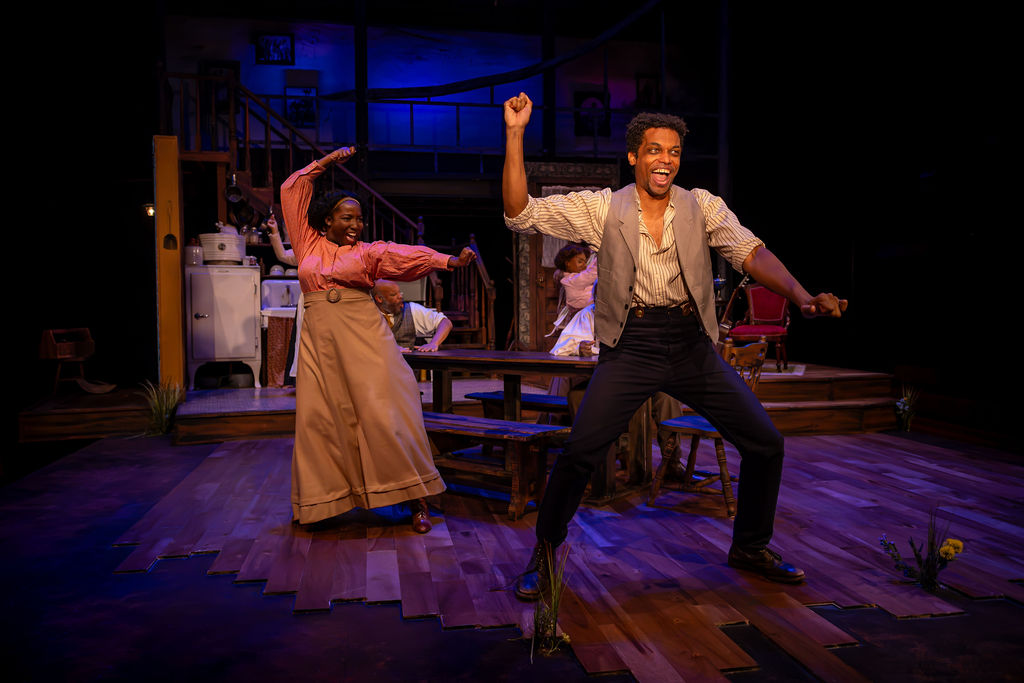If you forget your song or how to sing it, you forget who you are. There’s something powerful in that paraphrased saying from August Wilson’s Joe Turner’s Come and Gone, which is appearing live on the main stage at Chesapeake Shakespeare Company, as a part of the Baltimore City-wide “Baltimore August Wilson Celebration.” As the second production in this city-wide festival, committed to producing ten of August Wilson’s works in chronological order (of when they take place, not necessarily when they were written and published), Joe Turner’s Come and Gone is an evocative evening of spiritual realism with a haunting message about finding your path in life, your own inner peace, and moving to your own song. Directed by KenYatta Rogers, this emotionally visceral works dovetails on the success of Arena Players’ production of Gem of the Ocean (April 2024) which kicked-off the celebration and primes the audiences for the third production— Ma Rainey’s Black Bottom presented by ArtsCentric in March of 2025.
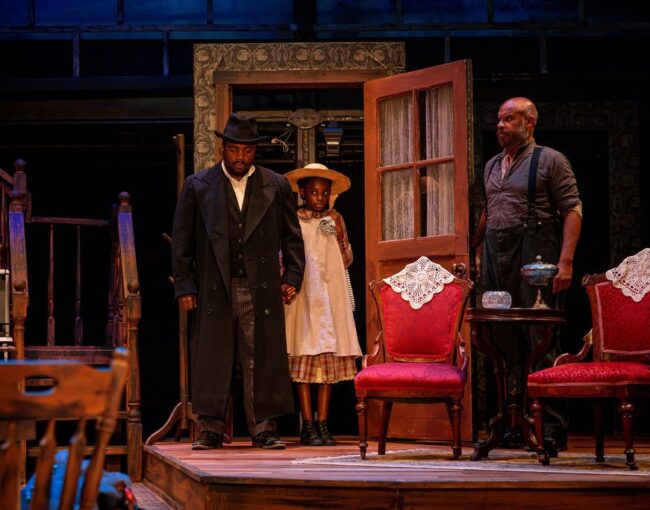
A boarding house in Pittsburg, August 1911. That’s the stated setting for Joe Turner’s Come and Gone and Set Designer Timothy Jones delivers this location in a conceptually realistic fashion. The main dining space, and the outside edges of the house, are what the audience is exposed to— with the elevated roofing arches suspended high above the play space to indicate a second and third story of the boarding house. The scenery is charming but dated, well-loved but clearly impoverished. Jones strikes a solid balance with the show’s aesthetic, assisted by Props Artisan Paige Stone, with a turn-of-the-century auger-style cooker, icebox, and wash-sink (with running water!) There are little bits of weeds and flowers growing around the outside edges of the house, and there’s very little to be seen on the ‘second floor’ but the beautifully timeworn staircase is an exceptional touch to the overall scenic view of the stage.
Costume Designer Wil E. Crowther sets to mind our location with his period appropriate and socioeconomically balanced sartorial selection. Seth and Bertha, the masters of the house, are hardworking individuals and their costumes reflect such, particularly with the buttons-down-the-back dress on Bertha and her neat but time-tested apron. You get an easy look about the Herald Loomis character from his heavy coat and fixed hat; in a similar vein you get the eccentric-flighty suggestion from Bynum’s threads. High class togs are featured on both Molly Cunningham and Martha Pentecost, with resplendent hats and equally fashionable dresses, though making Martha’s dress all white does setup quite the red-herring for the final scene as chaos devolves in that moment and anyone familiar with foreshadowing might expect a slightly different outcome, based solely on the color of that dress. Ultimately Crowther’s design work suits the performers, their characters, and the overall narrative of the show.
Lighting Designer Katie McCreary and Sound Designer Adam Mendelson have a curious partnership in this production. McCreary provides the standard ‘indoor versus outdoor’ lighting for this production but is also responsible for hinting at the magical-spiritual-realism…also referred to as ‘spooky stuff’ and ‘spooky business’ in this show. Whenever Bynum goes off on one of his rants…though some might call them spiritually guided anecdotes…there is a shimmer of ‘spiritual light’ that rains over the stage, often accompanied by some indescribable, unearthly but not wholly unpleasant soundscape work, conjured up by Mendelson. The end of Act I puts both McCreary and Mendelson’s imaginative capabilities to the test; it can simply be said that it’s sound-and-lights a la smoke and mirrors to achieve this otherworldly experience in that moment.
Gerrad Alex Taylor, wearing the trifecta of hats in his roles as Fight Director, Intimacy Director, and Dialect Director, masterfully puts all three of these skills on display in this production, though the fighting isn’t exactly what you’d expect, the intimacy is far more subtle, deeply demure and very tasteful, and the dialects are in their own right a delicate whisper on the ear. But for all three of these components to exist so naturally in the course of the production, allowing for the audience to stay enthralled with every moment of this somewhat lengthy play is a feather in Taylor’s cap and quite the accomplishment.
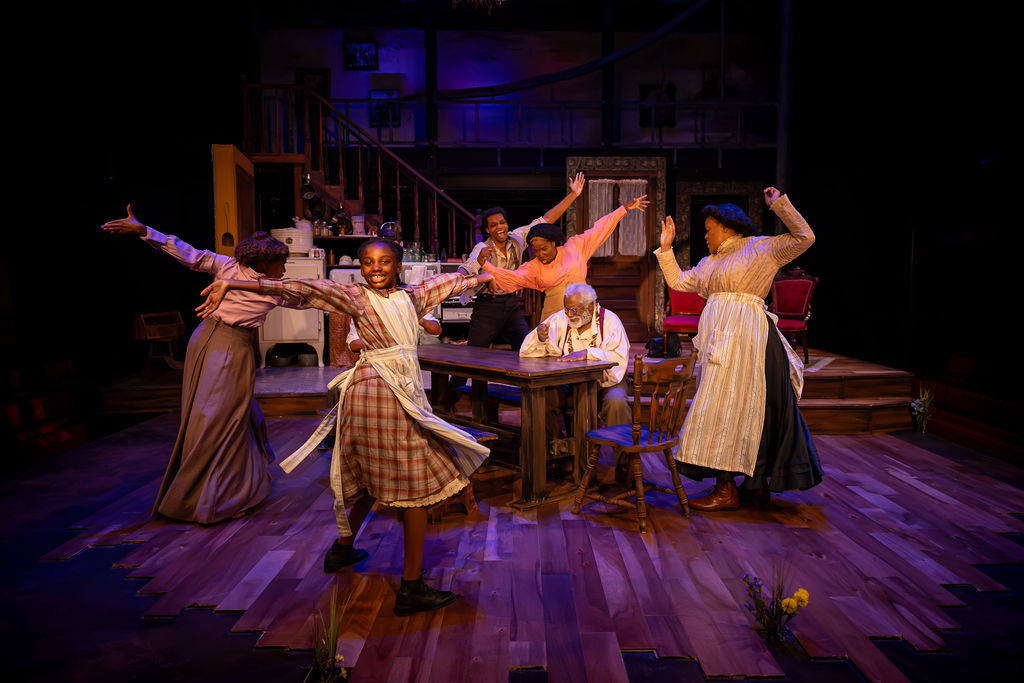
Director KenYatta Rogers keeps the show moving; this particular August Wilson play is lengthy but you don’t notice the passage of time itself as Rogers keeps the overall pacing drifting along at a clip. There’s a congenial naturality when it comes to the dialogue exchanges between characters as well, particularly Seth and Bertha, who are presenting the epitome of an old married couple every step of the way. Wilson’s work dabbles into magical-spiritual realism and Rogers does a fine job of balancing those moments— particularly the intense scene at the end of the first act— against the rest of the slice-of-life-drama style narrative that is woven into the play. Performances across the board are solid; everyone has a firm handle on the cadence and patois of their socio-economical station and of the time frame itself, making for a realistic and believable theatrical experience.
The two youngest characters, Zonia and Reuben (played at this performance by Kenya Mitchell and Andre Walker, respectively) are fascinating threads that are woven through the tapestry of Wilson’s work. While the Reuben character at times seems superfluous, Walker’s performance is charming. Mitchell, as the rather reserved daughter of Herald Loomis holds her own in scenes with adults, even though her character’s primary purpose seems to be ‘being seen and not heard’ as the adults have their drama and experience all around Zonia. Mitchell and Walker play well against one another, particularly in their ‘kiss-promise’ scene and it’s cheerfully delightful to watch.
While the character of Martha Pentecost (Lauren Davis) may only arrive in the final scene, you truly feel the weight of her presence when Davis steps into the action. Davis delivers ones of the most powerful lines in the production (though the character of Bynum has quite a few close contenders) “You got to be something… you just can’t be alive. Life don’t mean nothing unless it got a meaning.” And when she shouts that line in particularly at the Herald Loomis character, given all of the festering turmoil erupting around them all in that moment, it’s striking and evocative. Davis delivers that line and her series of others, particularly when she’s shrieking about Jesus, with such gusto, you feel as if she’s been there the whole time, rather than a character who just burst through the front door at the end of the show to bring resolution to the overarching problem of the play.
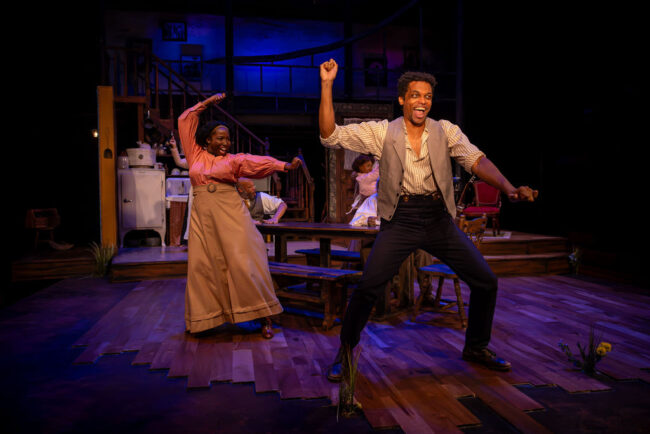
There are a lot of monologues penned into the dialogue exchanges in Wilson’s work, which creates for a lot of ‘active-listening’ moments among the other characters as they sit back, watch, and absorb what’s being said by their scenic partners. But there’s also a lot of bubbly and expressive moments— or in the case of Jeremy Furlow (Miles Folley), flirty moments— that just pop like bottle rockets all over the stage. While Folley gets his own heartfelt rant, trying to stand his ground regarding a foolhardy decision involving employment, he also gets a great many moments to be silly and flirty, all of which are received exceptionally well by the audience. First it’s with Mattie Campbell (Zipporah Brown Gladden) and later with Molly Cunningham (Mecca Verdell.) The pair of women could not be more opposite. Gladden plays Mattie, the lovesick, grounded woman while Verdell plays Molly, the high society wannabe, putting on airs and graces the likes of which seem to know no bounds. Both women create intriguing and compelling performances on stage, whether they’re interacting with Folley’s youthfully exuberant Jeremy, each other, or the other members of the boarding house.
You know you’re steeping yourself in the character correctly when the audience is nervous-laughing and cringing at the utterly inappropriate drivel rolling out of your mouth, and that’s exactly the success that Joe Crea achieves in the role of Rutherford Selig, especially when he starts gassing on about his long family lineage of being a ‘people finder.’ It seems harmless enough when he talks about how he finds “…negroes for negroes…” right up until he starts dating back a bit further, talking about how his grandaddy found people and put them on slave ships, then his daddy was a slave catcher, etc. All the while Crea is just beaming ear to ear with this fine lineage, and the audience is squirming in their seats watching this snake-oil salesman wax poetic about his noble past and present practices. It’s quite the accomplishment.
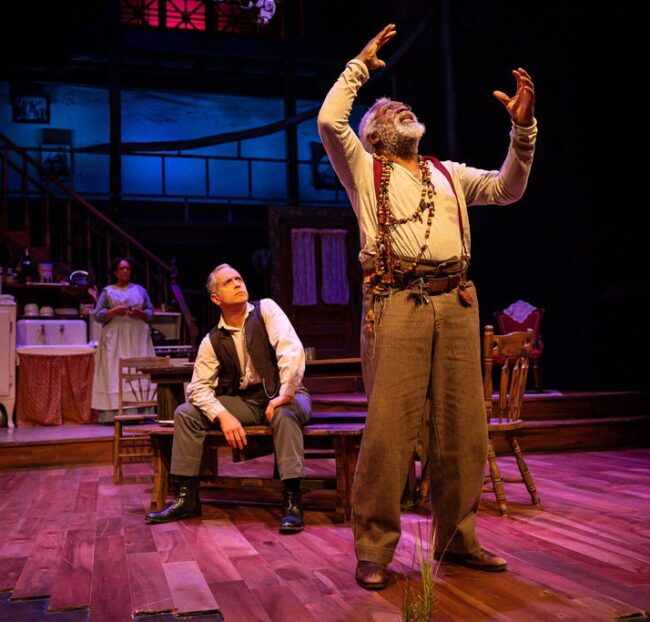
A good deal of humor gets delivered from Gregory Burgess’ portrayal of Bynum Walker. Every time he comes flying into the back door from outside, waving his gris-gris/juju duster over the doorway for protection and good luck, the audience is in stitches. Burgess delivers a compelling portrayal of this ‘Binder Man’, who does the ‘spooky stuff.’ And while there is a great deal of humor to be had from watching some of his antics on stage, especially when he’s clapping back at Seth, there’s also something undeniably intriguing about his performance. When he first starts down the anecdotal road of ‘the secret of life’ and song and ‘the shiny man’ it’s enthralling and you’ll find yourself sliding to the edge of your seat, hanging on his every word as if you’re actually expecting to learn some vast, eternal secret of life and the universe.
Herald Loomis (Josh Wilder) is the pinnacle around which the show’s drama revolves, arriving like an unexpected storm and with a matching temper to boot. Wilder (who at this performance was somewhat vocally blown-out, making it difficult to hear him at times, though he is no less emotionally invested in his performance) sends spine shivers up and out into the house far more than any hoodoo/voodoo/spooky stuff Bynum ever could. There is something feral and ferocious in the way that Wilder approaches the role of Herald Loomis, keeping that foreboding and ominous sense about the character at all times. Even in his moments of extreme vulnerability, when he’s confessing his own personal backstory— regarding the play’s title— you get the sense that Wilder’s Loomis is but a frayed thread away from snapping and going completely off the rails. It’s a vivaciously captivating, albeit terrifying, performance.
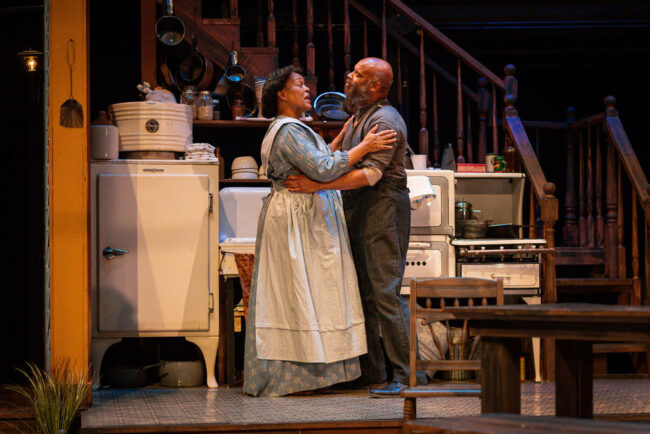
Seth (Jefferson A. Russell) and Bertha (Aakhu Tuahnera Freeman) are the vehicle through which August Wilson’s tale of Joe Turner’s Come and Gone transports itself. They are the staples of the narrative, the glue of the character interface, and ultimately the most entertaining people to watch as the story unfolds. There’s a tenderness to Freeman’s Bertha, even when she’s being somewhat sharp of tongue. And the bickering dynamic between Freeman’s Bertha and Russell’s Seth is not only hilarious but authentic on a level that defies description. Epitomizing a lovely, married-for-ages, couple who are just trying to eke out a living in their boarding house without trouble or drama, Freeman and Russell move the show along with their interactions, their background expressions, and their overall spatial and temporal awareness of both each other and the others with whom they interact. There’s something gorgeously comedic about Russell’s portrayal of Seth as well, especially when he starts down that line of “…from the moment I saw him I knew he was trouble…” referring to Herald Loomis. Russell gets the character easily riled up with quite a temper, one that is easily quelled by a simple word or two from Freeman’s Bertha; the dynamic is both endearing and realistic. Keep an eye on Freeman when she gives her best Bynum impressions, it’s a hoot!
It’s an experience to be had; a beautiful story and a passionate tale of self-discovery. As Director KenYatta Rogers said on opening night at curtain speech, “Theatre is the place where you know you can find your church” and that statement rings true for Chesapeake Shakespeare Company’s production of August Wilson’s Joe Turner’s Come and Gone.
Running Time: 2 hours and 40 minutes with one intermission
Joe Turner’s Come and Gone plays through October 13th 2024 with Chesapeake Shakespeare Company— 7 S. Calvert Street in Baltimore, MD. Tickets are available by calling the box office at 410-244-8570 or purchasing them in advance online.
For more information on the Baltimore City August Wilson Festival, click here.

